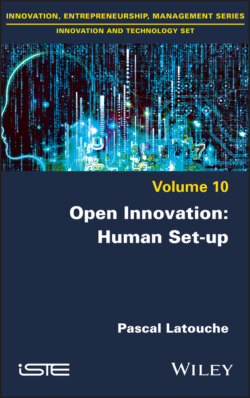Читать книгу Open Innovation - Pascal Latouche - Страница 16
Оглавление
Introduction to Part 1
The entrepreneur, as you will have understood, is one of the protagonists without whom the very object of this work would be meaningless. It is the entrepreneur who interests me, and it is their business development that motivates this book. Their business development is their life project, and they are trying to make a living out of it.
First of all, it should be noted that the entrepreneur has probably existed since the dawn of time. Men and women have had to take action for themselves, their loved ones, their families or more broadly for humanity to move forward. If today we reduce the notion of the entrepreneur to the one that comes to mind spontaneously, i.e. the digital entrepreneur, we cannot say that this is a recent phenomenon either. The democratization of the Web dates back to about 1989/1990. The end of full employment was combined with this democratization, and the entrepreneur (especially the digital entrepreneur) was then carried to the skies. If you can’t get hired, you might as well create your own job. Anyone who had a good idea and the means to develop it could call themselves an entrepreneur. I say could, because this is less true today and will probably be less and less true in the future, without a proper approach on the part of the entrepreneurial CEO. This is a far cry from the jeans/sneakers that are created in a garage and become a multinational company in just a few years.
Entrepreneurship has been and still is the subject of much analysis by the web media and other entrepreneurship consultants. The latter have taken the entrepreneur by the hand to talk about their inventions or to raise money from investors. These analyses have the merit of existing, even if they can sometimes be criticized for being too popular and not allowing useful lessons to be drawn from them. Entrepreneurs are “analyzed” in substance only recently thanks to the serious studies that real authors devote to them. This is a good thing as long as these analyses can be understood by the greatest number of people. Whether it is extension work or academic work, the right tone and substance must undoubtedly be found to enable entrepreneurs or future entrepreneurs to maximize their chances of success. This should also allow the large group to better understand the start-up “thing”, by taking advantage of it and avoiding disastrous relationships. Indeed, we must recall that these are first and foremost people who, as parallel employees in large organizations, or whose sole source of income is their entrepreneurial project, are certainly reshaping the world around us, but who must also be able to make a living from it. Entrepreneurs are indispensable for tomorrow because they are ultimately a “representative of intellectual growth” for society itself, with values and jobs at stake.
Contrary to my previous work, which was rather academic because it stemmed from my thesis on corporate open innovation, this book will be anchored in reality, palpable and audible to all, with a solid academic backdrop. Anchoring oneself in reality means observing and questioning real people without preconceived ideas. So that’s where I’m going to start to get you in the mood.
In this section, I will profile some entrepreneurs. I know hundreds of them. Why these? I cannot answer this question only rationally, because there are not only rational reasons. I was looking for profiles with technological and non-technological solutions. I was also looking for a certain mix. I was finally looking for personalities that you don’t hear much about, or even see at all, but who, in my opinion, don’t confuse entrepreneurship with being a Hollywood star. To begin this book, let’s discover groups of life… five women and two men!
